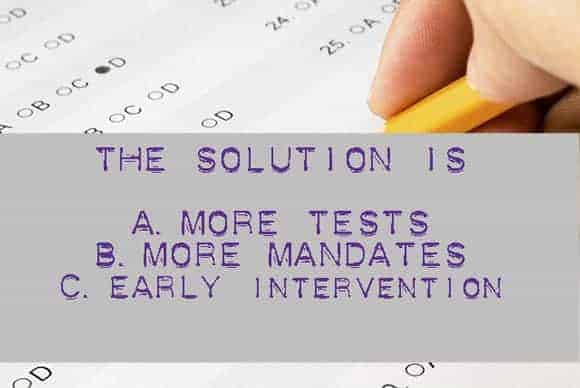The Truth about Standardized Testing
This post may contain affiliate links.
Linking standardized tests to funding, teacher pay, and/or school performance ranking, etc. creates a destructive avalanche of consequences for both children and teachers. It’s simple cause and effect. (Seemingly apparent to everyone except for the policy makers.)

Destructive Consequences of Testing
1. The MANIPULATION of students to perform well OR ELSE . . .
“your teacher will lose her job”
“you won’t get recess”
“you won’t get in good classes”
—> leads to ANXIETY in students.
Mom and blogger, Bernadette writes, “My daughter begins her 1st week of standardized testing today. She is so nervous, I hate seeing her like this — at 6 year old.”
2. RIGID mandates controlling the curriculum . . .
—> leads to LOSS OF PROFESSIONAL AUTONOMY and LOSS of teachers’ ability to make instruction about the CHILDREN’S NEEDS. The quality of instruction declines when teachers are forced to teach to the tests.
3. STRESSFUL environment in which teachers are expected to not grow their students from where they are but make them perform . . .
—> leads to GREAT teachers LEAVING TEACHING. (And stressed-out teachers CHEATING.)
4. Spending weeks or months preparing for the test . . .
—> leads to LESS learning and instruction time on what kids need to know.
5. Spending weeks taking tests at public schools . . .
—> leads to more and more families opting for HOMESCHOOLING or private schools..
Mom and blogger, Julie of Creekside Learning says, “This is one of the reasons my family decided to homeschool. Not that I am saying this is what everyone should do, it was just one of the main factors that influenced our decision.” Julie’s story is here.

Tests Are __________ ?
How do you know that these tests are even testing what they should be?
How do we know these tests are any good?
Students are being tested on too narrow a range of achievements says Rhona Weinstein, author of Reaching Higher: The Power of Expectations in Schooling. She adds that the same amount of money spent on testing could serve better purposes.
(I, for one, would like to see the full tests from each state.)

Poverty is the Problem
We know that high test scores do not reflect achievement as much as family income.
Linda Darling Hammond, author of The Flat World and Education, argues that the US doesn’t have an education problem, but a poverty problem. My blogger friend, Danielle Greco, attended a recent lecture where Darling Hammond shared that when you take out the scores of schools with high poverty rates, the US has the best educational system in the world. Countries that surpass us in education (like Finland and Singapore) treat their impoverished children so much better than our country does. Plus, the US has taken on Asia’s Drill and Skill teaching while Asia has become more and more progressive in their teaching.
“Research shows that test scores are a much better measure of family income than of student ability,” explains Susan Ohanian.

The Solution is Early Intervention (NOT More Testing)
“We know what to do to increase children in poverty’s success,” reminds educator, blogger, and mom, Rebekah Patel, “it’s called early intervention from the time of birth. Moms in poverty need support and training how to best create a supportive home environment. But nobody wants to put money into it even though it will save infinitely more money in the long run. These kids would grow up to have lower prison rates, lower birth rates, less substance abuse, more likely to graduate from college, etc.”
Testing doesn’t and hasn’t raised student achievement. See “Incentives and Test-Based Accountability in Education” from National Academy of Sciences.
What Will Raise Student Achievement Besides ECE
1. More opportunities for divergent thinking in schools.
2. Constructivist approach to learning using reading and writing workshops.
3. Highly-skilled teachers who love children.
Opt-Out of Tests!
P. S. Don’t forget that you can opt out of standardized testing. Parents can phone their state department of education and ask for the policy. Also, ask the school for a copy of the law. Go to the Opt-Out website and click on your state for more information.
Question: What are your experiences with the state mandated tests in the U.S.? What about those of you abroad?
KEEP READING:
Quick Picks for Reluctant Readers







P. S. Don’t forget that you can opt out of standardized testing. thanks i did not know i could opt out for my children. I for one think standard testing is out dated and wrong
My husband and I popped through McDonald’s a few days ago on his lunch break, and in our bag was a flyer for free breakfast Monday and Tuesday for kids taking the AIMS test (AZ standardized tests). Then yesterday we were at the grocery store and there were displays of cereal that had “breakfast helps you do better on tests” on the boxes. So I guess there is a marketing side to standardized testing as well. *sigh*
This is so true. My daughter found second grade very frustrating because all her class did the entire school year up until testing was language arts and math. No science, history, etc. Suddenly after testing, they had a field trip, and did a single section of history and of science. It was ridiculous. We switched to an online charter school for third grade.
It was no surprise that during that year, it was announced that the school was being closed down for poor performance and restarting as a charter school. I really think the excessive focus on test scores does far more harm than good. Bored kids, frustrated teachers.
Wonderful article. I taught biology for 8 years and found that because of the testing mandates I spent all my time teaching vocabulary. When it comes down to it, that is really all a multiple choice test can measure. Science is so much more than vocabulary and formulated responses to problems. I loved teaching and I loved all my students, but I was so discouraged because I was not teaching students to do science, instead I was teaching them to memorize it. I left teaching after my second child was born to stay home so that I could work with my kids (now 6 and 2). We haven’t gone full-on homeschool, I am just trying to supplement all that I know they are missing out on.
Very well written. I agree 100% with this, and it saddens me. Testing played a large role in our decision to homeschool. Unfortunately, homeschooling isn’t a reasonable option for all families. I wish we could rely on our public schools to give our children the education they deserve.